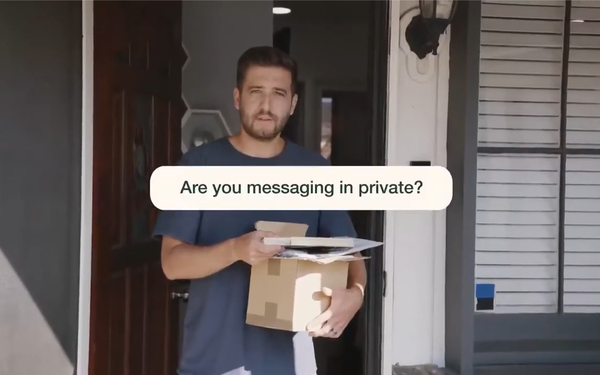WhatsApp Ad Doesn't Disparage Wireless Carriers, Self-Regulatory Group Finds
- by Wendy Davis @wendyndavis, February 6, 2023

Siding with Meta Platforms, an industry self-regulatory appellate panel has rejected the wireless industry's challenge to a WhatsApp commercial that touted the messaging service's privacy features.
The ruling, unveiled Monday morning by the National Advertising Review Board of the BBB National Programs, reverses some findings made last year by the National Advertising Division of the self-regulatory watchdog.
The 60-second spot -- "Doubt Delivered," which ran last year during the NFL's AFC Championship Games -- focused on WhatsApp's end-to-end encryption.
The ad depicts a mail carrier delivering already-opened packages to people's homes.
When one recipient asks the carrier why he's delivering mail that is open, he responds: “Don't worry. Nobody read them.”
At another point in the ad, one person on the carrier's route holds opened bills in her hand and asks the carrier: “Do you want to pay a bill since you went through them?”
The carrier tells the recipients that SMS texts are “just like these -- already opened,” referring to the mail he is delivering. He adds: “Like, if this was an unencrypted text, I just read it.”
A voiceover says unencrypted texts are "open," and the ad ends with a written screen telling people to protect their privacy by using WhatsApp's end-to-end encryption.
The trade group CTIA -- which represents AT&T, Verizon, T-Mobile and other wireless companies -- challenged the ad, arguing that it disparages wireless carriers and overstates the risks of unencrypted text messages.
The National Advertising Division issued a mixed ruling. That group sided with WhatsApp regarding statements that text messages are “open,” comparable to opened letters.
But the organization also said the ad conveys the unsupported claims that wireless carriers read people's texts, and that people need to use WhatsApp (or another specialized app) to guard against eavesdropping. The watchdog said WhatsApp should revise or halt both of those claims.
WhatsApp and CTIA then appealed to the National Advertising Review Board, which sided with WhatsApp regarding all claims.
The appellate panel said WhatsApp supported the claim that unencrypted messages are more vulnerable to interception than encrypted ones.
The organization also said the ad would not lead reasonable consumers to think mail carrier represented a wireless company.
“The panel believes that, in sending text messages, consumers do not focus on their wireless carrier, and nothing in the commercial directly or by implication references wireless carriers,” the panel wrote.


